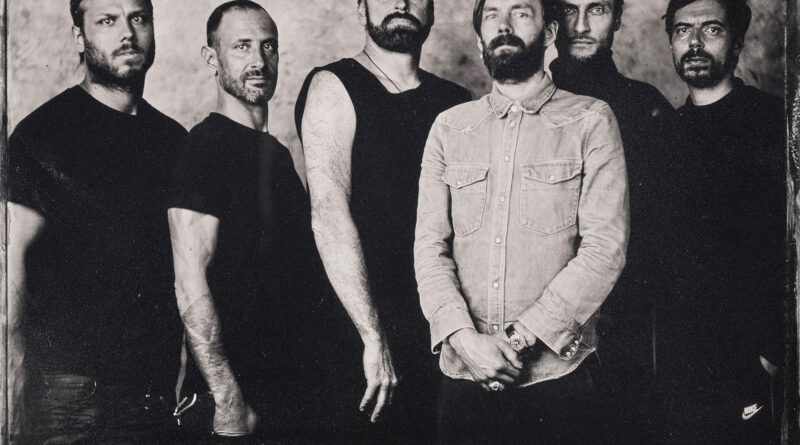The Ocean: Post-Metal For Post-Modern Times
THE OCEAN are no strangers to “big” topics; with albums critical of modern Christianity (Heliocentric, Anthropocentric) to claustrophobic dives into the subconscious and psychoanalysis (Pelagial) and now on Holocene, the fourth album in a series inspired by the geological eras of the earth, they’re tackling the modern age. The Berlin experimental, progressive post-metallers have consistently developed and pushed themselves on every album, with the last double outing of Phanerozoic I and II seen – rightly – as career high points. Naturally, we made sure to catch up with guitarist and band mastermind Robin Staps to talk all things Holocene, philosophy and why there’s a throughline to Fight Club.
While initially described as an appendix to the Phanerozoic albums, Staps is confident that it also stands on its own; “it’s definitely a chapter in its own right, it just dives deeper into one of the epochs of the Phanerozoic era,” he explains. “It’s something that started because Peter [Voigtmann, synths] and I started exchanging ideas during lockdown, without any intention of this becoming a new album.” In fact, they didn’t even think it wouldn’t be for THE OCEAN at all because of its creative distance to their earlier work, with a heavier emphasis on synths.
However, looking at the closing track of Phanerozoic II, Holocene, it becomes immediately apparent that there is a definite connection; its brighter, more synth-led sound ultimately signalled where the band were heading. “We felt the vibe of this new material was connecting with that, and that’s where the idea came from to take that as the starting point conceptually, and dive deeper into the Holocene epoch.” With this new material, Staps also felt it was time for another change; “I’ve always loved brass, but I’ve been afraid to fully embrace it because it can sound so pathetic. But it can also be heavy and monumental in its own right, and somehow the material Peter was writing, it was calling for brass. So quite early on, I made the decision to not use any of the other classical instruments we’ve worked with in the past.”
The decision to leave classical instrumentation outside of brass by the wayside had an immediate impact; along with the more electronic direction of the music, there’s a grandness, a majesty to Holocene that feels brash and modern, even while overall, it’s arguably less heavy in terms of distorted guitars than previous albums. “It makes it really broad,” he explains of the impact focusing on brass had on the album. “By doing that, it really contributed to the record having a sound unlike every previous THE OCEAN album.” From the pulsing opener Preboreal, the gentle, but insistent build through to Atlantic and its eventual explosion of heaviness, he’s not wrong; it’s identifiably THE OCEAN but more experimental than ever.
Another hallmark of THE OCEAN has always been their philosophical, critical mindset to lyricism and conceptual themes; something that is abundant throughout Holocene. While its titles reference the epoch’s five climatic ages, the lyrics focus again on philosophy and humanity, particularly on post-modern life and thought. “I was heavily under the influence of what was going on in the early stages of the pandemic, the craziness of a situation nobody had experienced before,” he explains of the concepts behind the album. “The social segregation that it brought, even among friends and family where people were divided into camps by what they were believing was happening and the arguments they had. All of that was a very bizarre time!”
Taking shape from his reading of French philosopher Guy Dubord, as well as the pandemic and divisive rhetoric that arose, Holocene began to take shape not as an album that tackled a single subject throughout, but a critique in many ways of postmodern thought and life, presented in the same way. “It’s a bit less conceptual overall,” he says, “but it’s a bit postmodern and deconstructivist – it’s a very patchwork record, lyrically.”
Parabiosis tackles societal obsession with youth; “in Berlin there’s almost no old people; they’re in the outskirts or small villages. Everyone in the city streets is young and healthy, death is just hidden from us.” Similarly picking up on Dubord’s critique of capitalism and consumerism, Staps notes the album critiques our own desire to buy things we don’t need; “we’re being kept in a hamster wheel,” he quips, raising a similarity to Fight Club (“it’s a very Guy Dubord inspired movie”). Elsewhere, Preboreal tackles Dubord’s Society of the Spectacle in which we feel forced to present only the best sides of ourselves; despite being written before Instagram and YouTube, Staps found the words to be eerily prescient to our modern times. “I found that mind-blowing, and under the umbrella of the general loss of critical thinking that happened in the early stages of the pandemic, they really forged the topics of this record.”
For all its clear-cut critiques and thought-provoking lyricism, he’s not entirely certain yet of what he hopes people take from Holocene. “One of the really beautiful and exciting aspects of releasing music is that you don’t know which tracks are going to stick extraordinarily,” he smiles, thinking back to how the thirteen minute Jurassic | Cretaceous from Phanerozoic II becoming a firm fan favourite. “I would love if people give it the time it deserves to be absorbed. It’s not a long record, but it’s one you need to digest as a whole.”
Holocene is out now via Pelagic Records.
Like THE OCEAN on Facebook.

